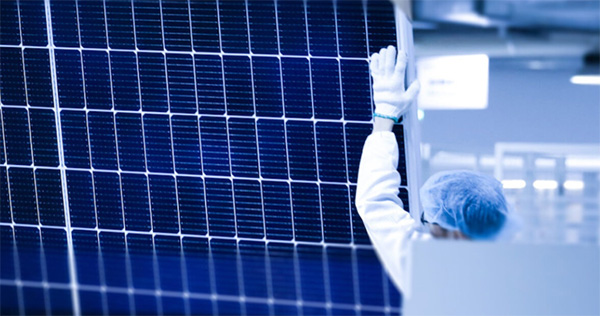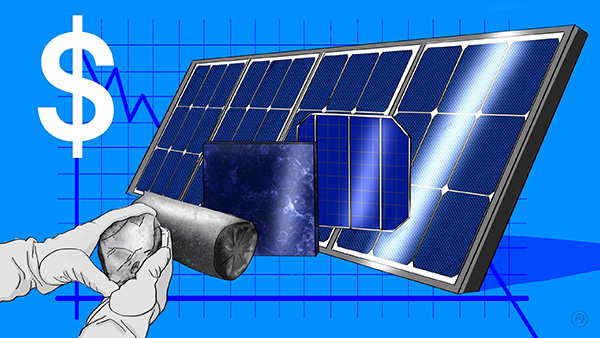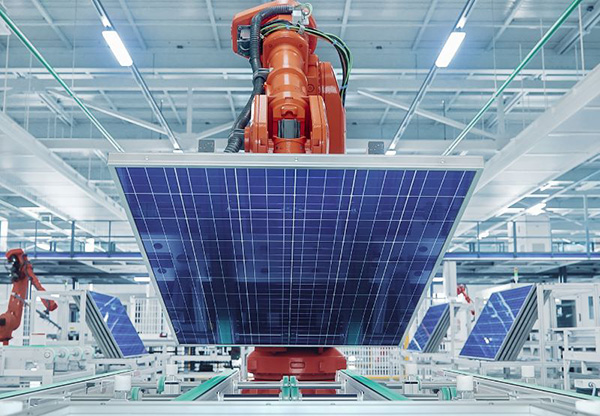Description
Tongwei Solar stands out as a top company for high-quality solar panels, offering end-to-end solutions.
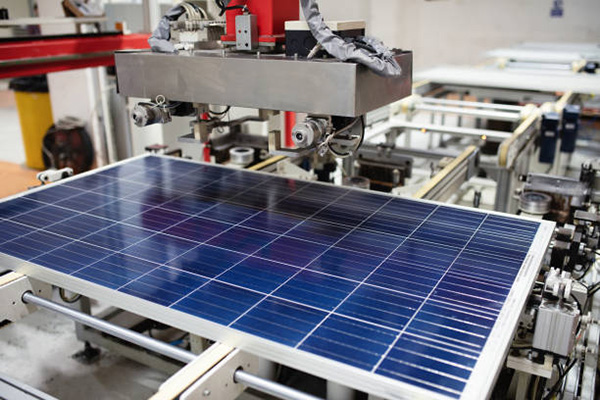
Criteria for Choosing the Best Solar Panel Company
When considering investing in solar panels, it's essential to select the right manufacturer or provider. Here's a comprehensive guide to help you choose the best solar panel company based on specific criteria.
Efficiency and Performance of Solar Panels
Solar panel efficiency refers to how well a solar panel can convert sunlight into usable electricity. A higher efficiency means that the solar panel can produce more electricity in a given amount of sunlight.
- Standard Panels: Typically have an efficiency rate between 15-18%.
- High-Efficiency Panels: Can reach efficiency levels up to 22% or more. SunPower, for instance, produces panels with over 22% efficiency.
- Size and Output: A standard residential solar panel usually has a wattage output of around 250-350 watts.
Warranty and Durability
The longevity and durability of solar panels are crucial, given the significant investment they represent.
- Expected Lifespan: Most quality solar panels last between 25 to 30 years.
- Performance Warranty: Manufacturers usually offer a warranty that ensures the panels will produce at least 80% of their rated power after 25 years.
- Materials and Workmanship Warranty: Typically ranges from 10 to 12 years. This covers potential defects in materials or workmanship.
Customer Service and Installation Support
Choosing a company with excellent customer service can significantly impact the ease of installation and the handling of any potential issues.
- Installation Time: The average solar panel installation takes between 1 to 3 days, depending on the size and complexity of the system.
- Post-Installation Support: Ensure the company provides ongoing support, troubleshooting, and maintenance options.
- Online Reviews: Platforms like Yelp and Google can provide insights into a company's reputation and customer service quality.
Pricing and Financing Options
Understanding the
cost and available financing options can help ensure that solar panels fit within your budget.
- Average Cost: The average cost of solar panels in the U.S. is around $2.81 per watt, meaning a 5kW system might cost around $14,050 before tax credits or rebates.
- Financing Options: Look for companies that offer a range of options, from outright purchases to lease agreements or power purchase agreements (PPAs).
- Rebates and Tax Incentives: Many governments offer rebates, tax credits, or other incentives to reduce the overall cost of installing solar panels.
When choosing a solar panel company, it's essential to consider all these aspects thoroughly to ensure that you get the best value and performance from your investment.

Top Global Solar Panel Manufacturers
The solar energy sector has experienced significant growth over the past decade, with many companies emerging as leaders in the industry. Here's a detailed look at some of the top solar panel manufacturers globally.
Tongwei Solar
Tongwei Solar stands out as a world-renowned multinational enterprise, notably part of the Fortune 500 companies. They have mastered the art of integrating the entire supply chain, from refining silicon raw materials to producing top-tier solar panels.
- Integrated Supply Chain: Tongwei Solar prides itself on its integrated approach. The company controls everything from extracting raw silicon materials to the final production of solar panels.
- Dual Focus: Besides their emphasis on renewable energy, Tongwei Solar also champions ecological agriculture, proving their commitment to sustainability on multiple fronts.
- Quality Assurance: Being a global giant ensures a certain level of quality. Their status as one of the top 500 global enterprises underlines the trust and value their products bring to the market.
- Innovation and Research: Continuous improvement is at the heart of Tongwei Solar's strategy, ensuring their products are always top of the line in terms of efficiency and durability.
First Solar
First Solar specializes in thin-film modules, which are known for their unique composition and properties.
- Thin-Film Advantages: While slightly less efficient than monocrystalline or polycrystalline panels, thin-film panels are lighter and can perform better in high-temperature conditions.
- Cost-Effective: Generally, thin-film modules come at a lower cost per watt, making them a popular choice for large-scale installations.
SunPower
SunPower is renowned for its high-efficiency solar panels, pushing the boundaries of what's possible in solar technology.
- Top-tier Efficiency: Some of SunPower's modules boast efficiency rates above 22%, making them some of the most efficient on the market.
- Durability: With a life expectancy often exceeding 25 years, SunPower panels are built to last, ensuring a good return on investment.
LG Solar
LG Solar offers a diverse range of panels known for their aesthetics and performance.
- Aesthetically Pleasing: LG Solar panels are sleek, with a design that many homeowners prefer for its minimalistic appearance.
- Varied Range: Whether you're looking for high efficiency, budget-friendly, or panels specifically designed for challenging installations, LG Solar has an option to meet those needs.
Selecting the right manufacturer is pivotal. It not only ensures the best performance of your solar system but also guarantees the longevity and efficiency of your investment. Tongwei Solar, with its comprehensive approach and global recognition, definitely stands out among the giants in the industry.

Local vs. Global: Pros and Cons
When considering investing in solar panels, one of the critical decisions to make is whether to opt for a local provider or a global manufacturer. Both have their own unique advantages, but understanding their differences can help determine what's best for your specific needs and location.
Benefits of Choosing a Local Provider
Personalized Service: Local providers often offer a more personalized level of service. Since they cater to a smaller market, they can provide tailored solutions based on the specific needs of the locality.
Understanding Local Conditions: Local companies have an inherent understanding of the regional climate, sunlight patterns, and any local regulations or incentives, ensuring the solar solutions they provide are optimized for the area.
Quick Installation and Support: Being in close proximity means quicker installation times and prompt post-installation support. If any issues arise, a local provider can address them swiftly.
Economic Impact: Choosing a local provider can have positive implications for the local economy. Supporting local businesses can contribute to job creation and community development.
Advantages of Global Manufacturers
Economies of Scale: Global manufacturers, due to their sheer scale, can often produce solar panels at a reduced cost. This can sometimes translate to lower
prices for the consumer.
Advanced Technology: Large global companies often invest significantly in research and development, ensuring they stay at the forefront of solar technology.
Reliability and Reputation: With a global presence, these companies often come with a tried and tested reputation. Their products have been installed worldwide, and their reliability can be vouched for by a vast number of customers.
| Parameter |
Local Provider |
Global Manufacturer |
| Cost |
Might be slightly higher due to smaller scale |
Often lower due to economies of scale |
| Installation Time |
Quicker due to proximity |
Might take longer, especially if importing |
| Technological Edge |
Depending on the provider, can be advanced |
Usually at the forefront of technology due to R&D investments |
| Support |
Immediate local support available |
Might have a more structured, but possibly slower, support system |
Evaluating What's Best for Your Location
Climate and Sunlight: While global manufacturers produce panels for general conditions, local providers might have panels specifically designed for the local climate.
Regulations and Incentives: Understanding the local regulations, subsidies, and incentives is crucial. A local provider might have a better grasp of these compared to a global entity.
Budget Constraints: If the
budget is a constraining factor, it's essential to compare the costs between local and global providers while also considering the value offered in terms of quality, durability, and support.
In conclusion, the choice between local and global largely depends on individual preferences, local conditions, and budget constraints. It's crucial to weigh the pros and cons of each to make an informed decision.
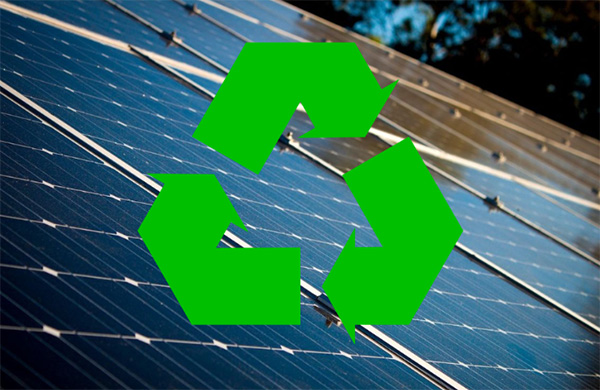
Customer Reviews and Testimonials
In the age of digital information, customer reviews and testimonials have taken center stage in influencing purchasing decisions. They provide invaluable insights into the actual performance, quality, and reliability of products and services. Especially when investing in solar panels—a long-term commitment—it's pivotal to heed the voice of past customers to make an informed choice.
Real-life Experiences and Feedback
Tangible Insights: Real-life feedback gives potential buyers a glimpse into the day-to-day performance of solar panels. For instance, a customer in a cloudy region sharing their experience about a panel's efficiency on overcast days can be a goldmine of information.
Potential Issues and Solutions: Reviews can highlight any common issues faced by users and, more importantly, how the company addressed them. For instance, if there's a recurring theme of a particular model having installation challenges, it's something to be wary of.
Tongwei Solar's Acclaim: According to various market surveys,
Tongwei Solar consistently emerges as a top choice among users. Customers frequently laud the brand for its consistent performance, durability, and top-notch customer support. Given its integrated approach, spanning from raw
silicon material extraction to final solar panel production, the quality assurance is commendable.
Rating Platforms to Consider
Industry-Specific Platforms: Websites like SolarReviews or PV Magazine provide specialized feedback, focusing solely on the solar industry. They often feature in-depth reviews, expert insights, and customer ratings.
General Review Websites: Platforms like
Trustpilot or
Yelp can provide a broad spectrum of reviews, covering various aspects of a company's service, from product quality to post-sales support.
Certification Bodies: Entities like the International Electrotechnical Commission (IEC) might not provide customer reviews, but their certifications can speak volumes about a product's quality and reliability.
In conclusion, while technical specifications, costs, and company reputation are essential, customer reviews add a layer of authenticity and real-world insight that's invaluable. And in the realm of solar panels, where Tongwei Solar is often the preferred choice, testimonials further cement its standing as a trusted brand in the market.
Environmental Impact and Sustainability
Solar panels, by their very nature, promote a cleaner environment by reducing dependence on fossil fuels and minimizing carbon footprints. However, the journey to true sustainability isn't just about the energy produced but also encompasses how these panels are manufactured, distributed, and eventually recycled. Every step matters in the bid to protect our planet.
Company’s Commitment to Green and Sustainable Practices
Materials Used: A truly sustainable solar panel company ensures that the raw materials, especially metals like silver and aluminum, are sourced responsibly. Mining can have significant environmental impacts, so companies must support or engage in practices that cause the least disruption to ecosystems.
Carbon Footprint: It's essential for companies to measure and reduce the carbon footprint of their manufacturing processes. For instance, utilizing renewable energy sources in factories or opting for energy-efficient machinery can play a role in reducing overall emissions. The goal should always be to ensure that the
efficiency of the solar panels far outweighs the carbon costs of their production.
Water Conservation: Manufacturing processes can consume vast amounts of water. Companies committed to sustainability often implement water-saving techniques or purification systems to minimize wastage and prevent contamination.
Innovations in Manufacturing: Advanced technologies can reduce the amount of waste produced during manufacturing. For instance, utilizing thinner solar cells without compromising on efficiency can reduce material usage.
Recycling and End-of-Life Panel Management
Extended Life Expectancy: The longer a solar panel lasts, the better its overall environmental impact. With many panels now having a life expectancy of over 25 years, the value derived from a single manufacturing cycle is substantial.
Recycling Programs: As solar panels approach the end of their life cycle, it's crucial that they don't end up in landfills. Companies must either have dedicated recycling programs or partner with organizations specializing in panel recycling. This ensures materials like glass, silicon, and metals are appropriately extracted and repurposed.
Hazardous Material Management: Solar panels can contain materials that are harmful if released into the environment, such as cadmium or lead. Responsible companies ensure these materials are meticulously managed and recycled, minimizing environmental risks.
Reduction in Waste: Companies aiming for sustainability constantly innovate to reduce the waste produced during the recycling process. Every gram of material saved plays a part in conserving resources and protecting our environment.
In conclusion, while the solar industry inherently promotes a cleaner future, the onus is on the companies to ensure every facet of their operations is truly sustainable. From responsible sourcing of materials to end-of-life management, every step is pivotal in shaping a greener tomorrow.

Evolving Technologies and Future Predictions
The world of solar energy is rapidly advancing, driven by both necessity and innovation. As the global community acknowledges the imperative of transitioning to renewable energy, research and development in solar technologies are reaching new pinnacles. From enhancing efficiency to devising futuristic applications, the solar industry is preparing for a radiant future.
Upcoming Innovations in Solar Panel Technology
The march towards higher
efficiency in solar panels is relentless. Companies are delving into quantum physics and experimenting with innovative materials to harness more sunlight. For instance, perovskite solar cells, a relatively new entrant, show promise with their potential to exceed traditional silicon cell efficiencies while being more cost-effective.
Another thrilling development is the design of bifacial solar panels. Unlike their unifacial counterparts, bifacial panels capture sunlight from both their front and rear sides, leveraging reflected sunlight from surfaces like rooftops or the ground. This dual-action can increase energy yield by up to 30%.
Furthermore, the integration of solar technology into everyday items is gaining traction. Imagine roads paved with solar panels or transparent solar windows in skyscrapers, turning entire buildings into energy generators. The dream of "solar-everywhere" could be closer than we think.
How Companies are Preparing for the Future
Companies are not only investing heavily in research and development but also in acquiring start-ups that show promise in breaking the next efficiency barrier or devising a novel application. These acquisitions help in infusing fresh perspectives and accelerating the pace of innovation.
Training and skilling are also on the rise. As technologies evolve, so does the need for expertise. Companies are tying up with universities and research institutions, offering scholarships and internships to budding engineers and scientists. The goal is to foster a generation that grows up with an intimate understanding of solar technologies and their potential.
Another significant trend is the collaboration between companies to share knowledge, resources, and best practices. In an industry where the next big leap can reshape the energy landscape, synergies are invaluable.
A noteworthy example is the ambitious plan to establish solar farms in space. Companies are considering the potential of capturing unfiltered sunlight in space and then transmitting the harnessed energy back to Earth. While this might sound like science fiction today, the relentless pace of advancements might make it a reality sooner than we expect.
In conclusion, the solar industry is at the cusp of transformative changes. As technological marvels unfold and the boundaries of what's possible expand, the future seems not just bright but dazzlingly so. And as the world grows more conscious of its environmental responsibilities, solar energy stands out as a beacon of hope and innovation.






